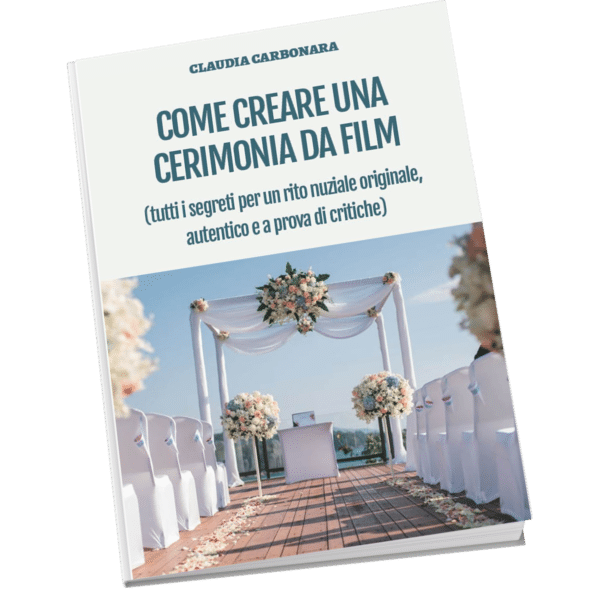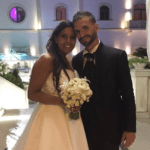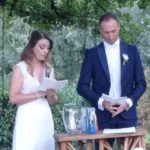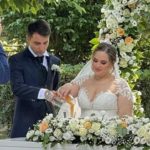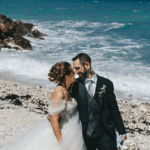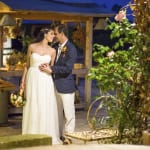Una delle domande più frequenti sul mio lavoro è di solito evitata dalle coppie. Ce l’hanno in mente, ma non chiedono, perché hanno paura di affrontare una conversazione imbarazzante. Ricordate, quando siete con me, non dovete aver paura di niente, perché sono assolutamente sicura che non esistano domande sbagliate.
Siete costretti a fare domande, se avete a cuore la vostra cerimonia di nozze, lo so benissimo, quindi scrivetemi se avete qualche incertezza, sono qui per aiutarvi! A proposito, ecco la risposta a questa domanda in particolare.
A che serve una celebrante?
A volte i coniugi sono già legalmente sposati quando arrivano alla loro cerimonia di nozze, a causa delle difficoltà della burocrazia italiana, o per l’impossibilità di avere un matrimonio civile nella location di cui si sono innamorati. Ciò significa che non hanno bisogno del sindaco o di un delegato dal municipio, per celebrare il loro matrimonio.
In Italia, inoltre, non c’è un registro per officianti laici e non ci sono scuole in cui celebranti esperti insegnano come fare questo lavoro (questo è il motivo per cui ho studiato con insegnanti inglesi e americani), quindi non è una questione di certificazione, perché i diplomi stranieri non sono un parametro.
Si tratta di competenza, esperienza e ruolo.
L’officiante di matrimonio rappresenta la comunità, è una sorta di portavoce, scelto dalla coppia, che è diventato il simbolo della comunità riunita dei loro parenti, amici e conoscenti. Quindi rappresenta l’autorità per elezione. Ha il compito di guidare la coppia attraverso tutto il processo e i preparativi e deve essere disposta ad assumersi questa enorme responsabilità.
Questo è un ruolo difficile da gestire e richiede esperienza, onestà e un forte impegno. Per questo è molto importante scegliere la persona giusta.
La celebrazione di una cerimonia è, inoltre, qualcosa che ti fa ritrovare coinvolta nel profondo, ogni coppia e famiglia infatti ha la sua storia, fatta di gioie e di dolori e l’officiante non può rimanere insensibile (a meno che non si di marmo, cosa che io non sono). Quando si uniscono due persone in matrimonio si resta in qualche modo collegati con loro. Questa è una cosa che posso raccontarvi, ma che di solito la gente non riesce capire veramente, perché ti sorprende quando celebri la prima cerimonia e ti sorprende ancora ad ogni cerimonia successiva.
Matrimonio dopo matrimonio, la celebrante porta con sé un pesante bagaglio pieno di esperienze, emozioni e connessioni profonde, cerimonia dopo cerimonia diventa il legame tra diverse famiglie e comunità in tutto il mondo. E, ultimo ma non meno importante, essere votata a questo lavoro ti rende ancora più sensibile e in grado di capire le piccole sfumature che annunciano una cerimonia di successo o una fragile (e ti permettono di reagire di conseguenza per il bene e la soddisfazione degli sposi).
Quando celebro una cerimonia la “sento”, l’ho compresa ad un livello profondo, in altre parole, so cosa fare, di conseguenza tutti i partecipanti si fidano perché lo notano e sanno che la mia esperienza e la mia sensibilità sono il valore aggiunto ad un testo ben scritto e personalizzato e alle promesse nuziali più romantiche.
In conclusione è a questo che serve la celebrante, è qualcuno che può aiutare le coppie e le famiglie, in grado di comprendere il significato e il valore della cerimonia in ogni sua più piccola parte, a livello profondo e può facilmente rappresentare l’autorità eletta, il fulcro stabile della cerimonia, che permette alla coppia di brillare e sentirsi al sicuro e compresa.
Che ne pensate? Secondo voi a che serve una celebrante?
Raccontatemelo con un commento o una mail
Love
♥♥♥ Claudia
One of the frequently questions about my job is usually avoided by the couples. They have it in their mind, but they don’t ask, because they are afraid to face an awkward conversation. But, when you are with me, you don’t have to fear nothing because I’m completely sure that there isn’t such thing as a wrong question.
You are compelled to ask if you care about your wedding ceremony, I know it very well, so write me if you have any uncertainty, I’m here to help you! By the way, here’s the answer to this particular question.
What is the officiant for?
Sometimes the spouses are already legally married when they arrive at their wedding ceremony, due to the difficulty of Italian bureaucracy, or due to the impossibility to have a civil wedding in the venue they have fallen in love with. This means that they don’t need the major or a delegate from the town hall in order to celebrate their marriage.
In Italy, furthermore, there isn’t a register for laic officiants and there aren’t schools when expert celebrants teach how to do this job (this is why I studied with English and American teachers), so it isn’t a matter of certification, because foreigner degrees are not a parameter.
It is a matter of competence, experience and role.
The wedding officiant represents the community, is a sort of spokesperson, chosen by the couple, that became the symbol of the united community of their relatives, friends and acquaintances. She represents the authority by election. She has the duty of guide the couple through all the process and the preparations and she has to be willing to take this huge responsibility.
This is a difficult role to manage and requires experience, honesty and a strong commitment. It’s very important to choose the right person.
Performing a ceremony is also something that make you find involved in a deeply way, each couple and family has its story, made of joy and sorrow and the officiant can’t stay insensitive. When you unite two people in marriage you become connected with them. This is a thing that people can’t really understand because it surprise you when you perform your first ceremony and anytime you perform a ceremony.
From wedding to wedding, you bring with you a heavy luggage full of experiences, emotions and connections, from ceremony to ceremony you became the link between different families and communities all around the world. And, last but not least, your commitment to this job makes you even more sensitive and capable to understand the little undertones that announce a successful ceremony or a fragile one.
When I perform a ceremony I feel it, I deeply understand it, in other words I know what to do, And the participants trust me because they know my experience and sensitivity are the added value to a well written and custom text and to the most romantic vows.
So this is what the officiant is for, someone who can help couples and families, who understand the meaning and the value of the ceremony in any little part, at a inner level and can easily be the elected authority, the fulcrum of the ceremony, made to let the couple shine and feel safe and understood.
What do you thing about this? In your opinion what is the officiant for?
Let me know with a comment or send me an email
Love
♥♥♥ Claudia
PH samallencreates.com


